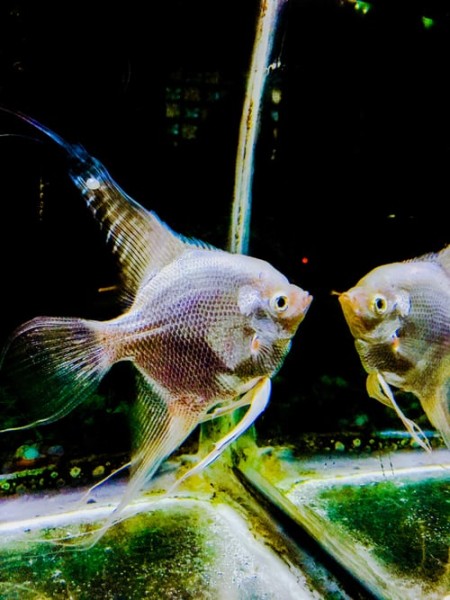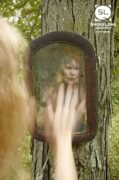My daughter is careening around the backyard, running in circles with her body tilted toward the ground, seeing how far she can angle before she falls. I stand at the window with the cordless, listening to the hospital social worker explain my mother’s recent episode. As is inevitable, my daughter falls over and laughs and reaches her arms out, embracing empty air.
“Argemina!” she yells. “You nut.” It’s what I tell her when she’s being wackypants.
The social worker is saying my name. She’s saying they’re adding dissociative disorder to my mother’s diagnosis. Fine, I say, sounds good. There’s a pause; she knows I’ve not been paying attention. Her sigh tells me she is a mother too, that she understands there is only so much attention you can give two people at once. They will call me with updates, she says, and my mother will likely be released in another week or two, once the medications have taken over, evened out. As soon as she stops talking to people no one else can see.
At the fish store, my daughter gazes, mouth agape, in front of the wall of tanks. Mollies. Tetras. Guppies. Black-finned sharks, cruising lazily. Bun-bun dangles from one hand, the other extended, hand hanging limp, as though it’s wrapped around the shoulders of a child beside her.
“Over here,” I call and she drops her arm, ambles over, calling Argemina to follow when she has apparently remained by the cichlids.
“We want two angelfish,” I tell the clerk, a high school boy. “A breeding pair.”
He nods thoughtfully and bends, hands on knees to examine the tank. “No way to tell which are breeding. No way to tell if they’re even boys or girls.” He winks at my daughter. He gets a net and a baggie and lifts the lid. “They either mate or one [kills] the other.” He mouths it but my daughter is astute.
“Kills?”
“Whoops,” he says, “Sorry.”
I flap a hand; a problematic word being spoken in front of my daughter ranks pretty far down the current list of concerns.
It is a laborious process, but there are two he’s noticed keeping close together most of the time, swimming in tandem. “Best friends,” he says.
“Like me and Argemina!” my daughter chimes in, her arm back to hanging mid-air, her hand giving a quick loyal pump as though there’s a real shoulder she can feel under her palm.
So slowly I want to gouge my eyes, fish-boy dips the net and trails behind the two he has in mind. The fish within spring to frenzied life, the whole tank taking on the look of an animated Escher sketch. How he keeps track of these two is beyond my abilities; they all look the same to me. But then there they are, in the bag. He explains which type of tank we want, which type of filter, which type of substrate.
“Not rocks,” he corrects when my daughter and I both gravitate toward ones that glow under a blacklight. “Sand,” he says with authority. “The eggs will fall between rocks, the fry will get lost and can’t get back up. With sand, the angel mommy can scoop the eggs, the fry, and keep them safe.”
What about the invisible fry-friends, I want to ask, how will she know where they are?
He sends us out the door with a good luck and two suckers clasped in my daughter’s hand, neither for me.
My mother and daughter sit at a table in the day room and play checkers. It is her favorite thing about when Grammy “goes on vacation.” I would buy a set for home, but something about it feels accusatory, as though if we had checkers in our house, it would be like saying it’s just a matter of time. Which it is.
A woman shuffles over, heavily drugged. She reaches for the third chair but my mother and daughter both say, “taken” at the same time, eyes never leaving the board.
“Share the table, Littlebiggle,” I say.
“There’s nowhere left to sit,” my mother says.
The older woman has already moved off, unfazed by the rejection. She perches at the end of a plastic couch, breaking leaves off the ficus and nibbling on them.
My mother triple jumps my daughter’s black discs. “So Argemina, what are you getting up to these days?”
They both make the non-verbal tics of conversations. Grunts of assent. Head nods. Hmmph’s and how interesting’s.
Later, when my daughter is in the nurse’s station learning how to sort pills, I hold my mom’s hands. From the outside, you would never know she was mindsick. But every once in a while, she turns her head and says things like “I know. I KNOW!” so softly.
“Mom,” I say, “please don’t encourage this pretend friend thing.”
“What pretend friend?”
“Mom. Argemina.”
My mother holds my gaze for a long time. Perhaps it is really a few seconds. Perhaps it only feels like eons because I never look in her eyes anymore – they are either blank from meds or frenetic with all the things she wants to say but won’t, knowing what I’ll have to do next.
“Just because you can’t see someone doesn’t mean they aren’t real.”
I sigh.
I cringe under her expression, resenting it too. Pity. Her poor befuddled daughter. This person who is bound by the laws of physics and reality which she discarded decades ago. I am stifled. I am repressed. I am the grandchild of people who met in an insane asylum. I am the mother who watches and waits, for myself, for my daughter.
At home, my daughter is back in the yard, this time with bubbles. She blows slowly, making large, gamboling orbs. She blows quickly and they are small and whisperfast.
“That one!” she yells, laughing as they pop. “That one, Argemina! That one!”



 The SmokeLong Grand Micro Contest (The Mikey) is now an annual competition celebrating and compensating the best micro fiction and nonfiction online.
The SmokeLong Grand Micro Contest (The Mikey) is now an annual competition celebrating and compensating the best micro fiction and nonfiction online.